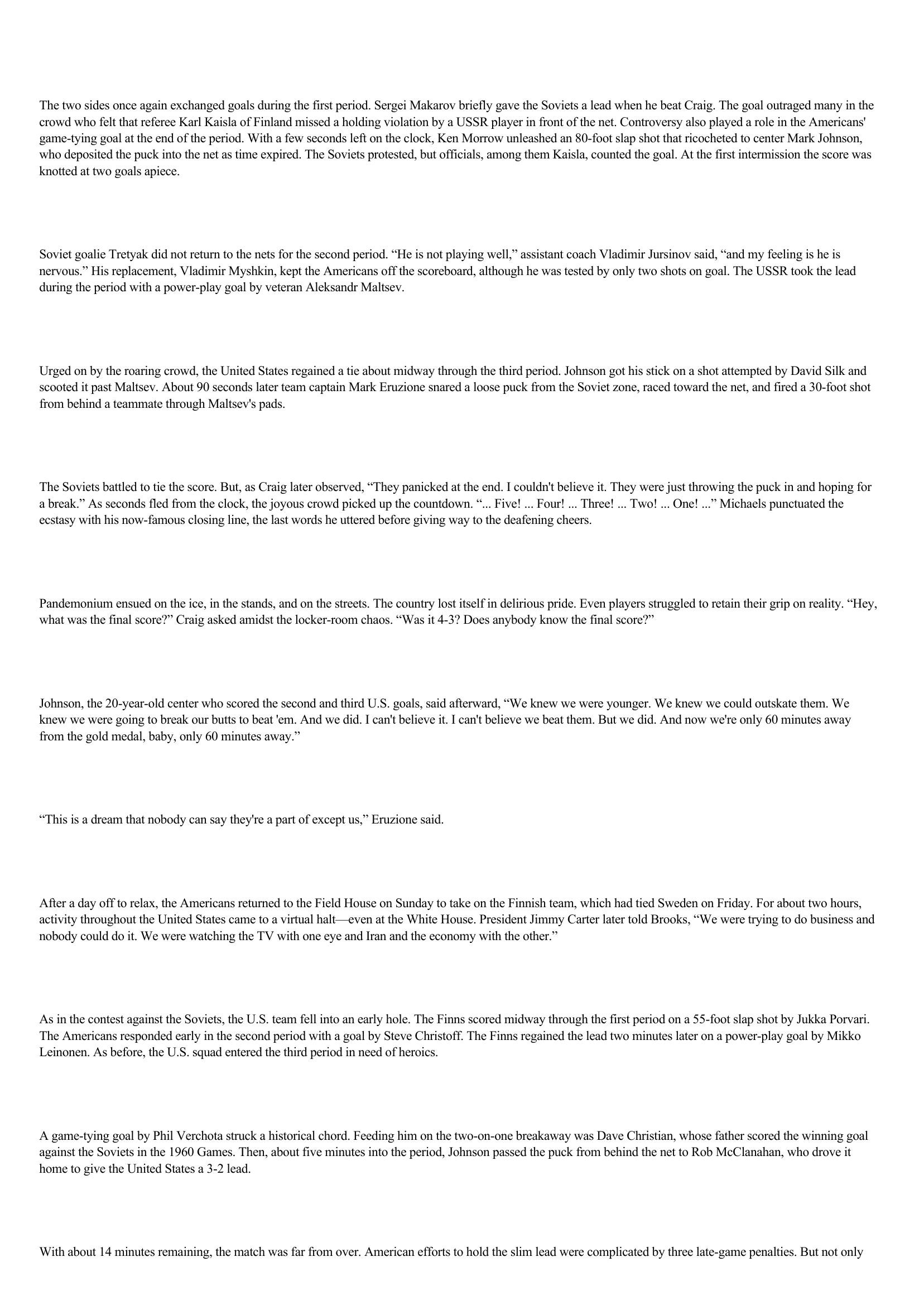US Beats USSR in Hockey.
Publié le 14/05/2013
Extrait du document
«
The two sides once again exchanged goals during the first period.
Sergei Makarov briefly gave the Soviets a lead when he beat Craig.
The goal outraged many in thecrowd who felt that referee Karl Kaisla of Finland missed a holding violation by a USSR player in front of the net.
Controversy also played a role in the Americans'game-tying goal at the end of the period.
With a few seconds left on the clock, Ken Morrow unleashed an 80-foot slap shot that ricocheted to center Mark Johnson,who deposited the puck into the net as time expired.
The Soviets protested, but officials, among them Kaisla, counted the goal.
At the first intermission the score wasknotted at two goals apiece.
Soviet goalie Tretyak did not return to the nets for the second period.
“He is not playing well,” assistant coach Vladimir Jursinov said, “and my feeling is he isnervous.” His replacement, Vladimir Myshkin, kept the Americans off the scoreboard, although he was tested by only two shots on goal.
The USSR took the leadduring the period with a power-play goal by veteran Aleksandr Maltsev.
Urged on by the roaring crowd, the United States regained a tie about midway through the third period.
Johnson got his stick on a shot attempted by David Silk andscooted it past Maltsev.
About 90 seconds later team captain Mark Eruzione snared a loose puck from the Soviet zone, raced toward the net, and fired a 30-foot shotfrom behind a teammate through Maltsev's pads.
The Soviets battled to tie the score.
But, as Craig later observed, “They panicked at the end.
I couldn't believe it.
They were just throwing the puck in and hoping fora break.” As seconds fled from the clock, the joyous crowd picked up the countdown.
“...
Five! ...
Four! ...
Three! ...
Two! ...
One! ...” Michaels punctuated theecstasy with his now-famous closing line, the last words he uttered before giving way to the deafening cheers.
Pandemonium ensued on the ice, in the stands, and on the streets.
The country lost itself in delirious pride.
Even players struggled to retain their grip on reality.
“Hey,what was the final score?” Craig asked amidst the locker-room chaos.
“Was it 4-3? Does anybody know the final score?”
Johnson, the 20-year-old center who scored the second and third U.S.
goals, said afterward, “We knew we were younger.
We knew we could outskate them.
Weknew we were going to break our butts to beat 'em.
And we did.
I can't believe it.
I can't believe we beat them.
But we did.
And now we're only 60 minutes awayfrom the gold medal, baby, only 60 minutes away.”
“This is a dream that nobody can say they're a part of except us,” Eruzione said.
After a day off to relax, the Americans returned to the Field House on Sunday to take on the Finnish team, which had tied Sweden on Friday.
For about two hours,activity throughout the United States came to a virtual halt—even at the White House.
President Jimmy Carter later told Brooks, “We were trying to do business andnobody could do it.
We were watching the TV with one eye and Iran and the economy with the other.”
As in the contest against the Soviets, the U.S.
team fell into an early hole.
The Finns scored midway through the first period on a 55-foot slap shot by Jukka Porvari.The Americans responded early in the second period with a goal by Steve Christoff.
The Finns regained the lead two minutes later on a power-play goal by MikkoLeinonen.
As before, the U.S.
squad entered the third period in need of heroics.
A game-tying goal by Phil Verchota struck a historical chord.
Feeding him on the two-on-one breakaway was Dave Christian, whose father scored the winning goalagainst the Soviets in the 1960 Games.
Then, about five minutes into the period, Johnson passed the puck from behind the net to Rob McClanahan, who drove ithome to give the United States a 3-2 lead.
With about 14 minutes remaining, the match was far from over.
American efforts to hold the slim lead were complicated by three late-game penalties.
But not only.
»
↓↓↓ APERÇU DU DOCUMENT ↓↓↓
Liens utiles
- hockey.
- Hockey sur glace : palmarès JO - sport.
- Hockey sur glace : palmarès des Championnats du monde.
- Hockey sur gazon : vainqueurs de la Coupe du monde - sport.
- Hockey sur gazon : palmarès JO - sport.

































